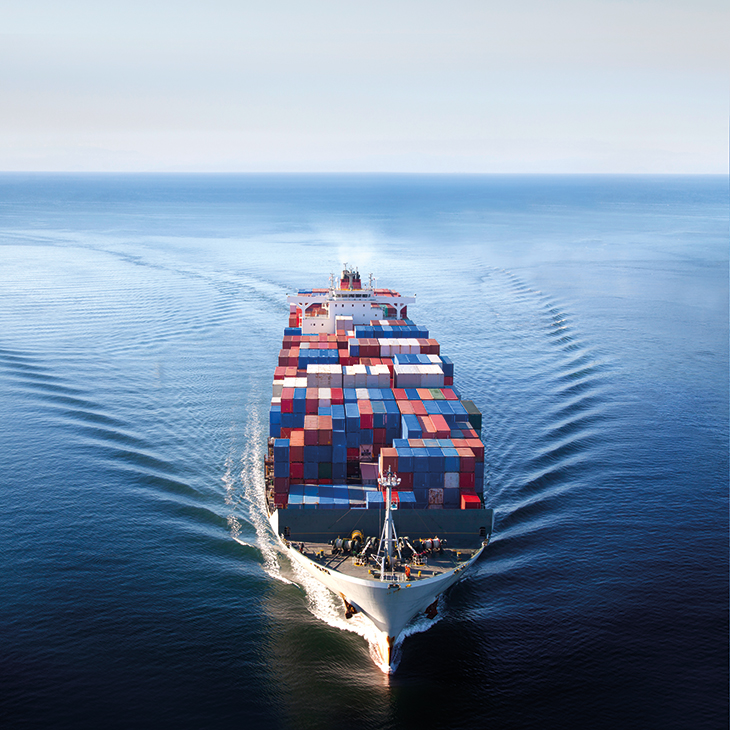
Maritime Insurance
Frequently Asked Questions
More than just transport by sea
Maritime insurance, including Cargo and Carriers policies, can provide coverage no matter how your goods are being moved. Let’s look at some of the most common questions about different policies and coverage levels.
Marine insurance is a misleading title because it has grown over the years to cover other non-marine exposures. It essentially relates to the movement of goods or operations involving (at some point) watercraft. It could include ship repairers, for example. Goods are covered whether moved by air, road, rail, ship or sea. They also may be held in storage for short periods during transit and are still covered.
A cargo policy covers the owner of the goods for losses that are caused by one of the insured perils (i.e., listed dangers) when the goods are being moved. This includes on sea, in the air or by road or rail. Similarly to property cover, a cargo policy is a first party policy. That means only the person who owns the goods can – or should – purchase a cargo insurance policy.
If the goods are being transported by a professional transport operator/carrier for other companies, a carriers policy can be purchased. This policy covers loss or damage to the goods while they are in the carrier’s care, custody or control during movement of the cargo (typically by road in Australia and New Zealand). It covers the carrier for what they would be obliged to pay the owner of the goods if an insured peril occurs.
Cover can be provided on a liability basis under a Carriers Legal Liability policy or on a goodwill basis (where the carriers wishes to have the claim settled to protect a commercial relationship) with a Carriers (Goods In Transit) policy.
A company transporting goods for other companies can purchase Carrier policies.
In this context, average means loss.
General Average is an old concept in maritime law. If your goods are being carried by sea and they have to be sacrificed in an emergency so that the ship and all the other cargo make it to a port, the owners of the ship and cargo that are saved have to contribute to pay for your loss. So, everyone involved suffers a general loss. Everyone also needs to pay for the salvage costs, which can be substantial if the ship is rescued when at sea.
A ship owner may declare General Average after a major incident that incurs losses. The costs can be significant – as much as 40% of the value of the cargo that will have to be paid in addition to the usual freight costs. General Average is usually an insured peril under marine cargo policies.
The ship owner will not release goods until the cargo owner has paid a deposit for the General Average or provided some other acceptable form of security such as a bond. A cargo insurer can provide this bond and have the goods released to your client as part of the insured cover.
Incoterms are globally recognised rules that enable buyers and sellers of goods and financiers to clearly set the terms of a transaction. The rules specify timing and responsibility of actions in arranging the transportation of the goods. This includes when risk passes from buyer to seller, who arranges transport, clearances and authorisations, and who will arrange and pay for insurance.
The Incoterms help determine who needs to insure the goods for which part of the carriage. The insurance policy can also transfer from buyer to seller in some circumstances – a unique part of marine cargo insurance!
To find out more go to Incoterms 2020 Explained – The Complete Guide
The Institute Cargo Clauses, developed by the International Chamber of Commerce, are used to insure loss or damage to goods in transit. While the wording is standardised, different extensions and clauses can be added. The three main types are known as A, B and C Clauses which each have different levels of cover.
A Clauses are the widest and least restricted. While they may be quoted as being all-risks, this can be misleading as there may be some applicable restrictions. A Clauses are usually used on finished goods that have been professionally packaged for carriage.
B Clauses are a bit more restricted. They do not cover theft, contamination or damage by freshwater.
C Clauses are the most restrictive. The same exclusions apply as to B, but losses arising from cargo going overboard, any kind of wet damage (sea or fresh), earthquake, volcanic eruption and lightning are all excluded.
The premium is likely to get cheaper as the cover is reduced, but you should consider whether the cover is suitable for the goods being moved. For example, does a bulk cargo of rubber need to be insured under A Clauses, but equally does it make sense to insure sensitive finished white goods under C Clauses just for a cheaper premium?
If you have any other Marine questions, please contact us on:
Email: marine.hub@zurich.com.au
Phone : 1800 426 021 (option 2)